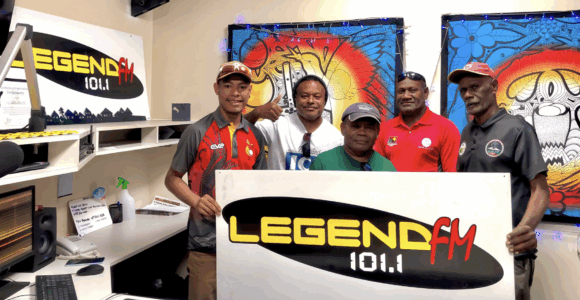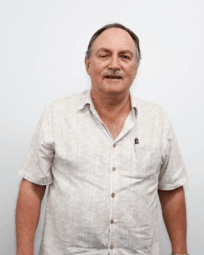As Communications Fiji celebrates its 40th anniversary, its Chairman William Parkinson sits down with Business Advantage PNG to reflect on his company’s rise from a single Suva radio station to a media powerhouse in both Fiji and Papua New Guinea.

QUAKES BAND with the team at Legends FM 101.1, a Papua New Guinean FM radio station. Credit: Legends FM
In an age where traditional media models are being disrupted, Communications Fiji Limited (CFL) Chairman and Co-Founder William Parkinson believes his firm has the formula to not only survive but thrive in two very different Pacific markets.
Founded in 1985 with the establishment of Fiji’s first commercial radio station, FM96, CFL listed on the South Pacific Stock Exchange in 2001 and now holds a market-leading position in commercial radio in both Fiji and Papua New Guinea.
“We’ve had to totally change the way we look at talent – our radio personalities now have to be social media influencers as well.”
Parkinson, who was born in New Zealand and raised in Fiji, says CFL’s success has been built on intimate local knowledge.
“Because we are from the Pacific, I think we understand our markets in intricate detail, and have come up with a formula to target sectors of the community,” he tells Business Advantage PNG.
“It’s very different from an Australian or a Western model, which is largely age-based, because we have cultural, racial and language factors to take into account.”

William Parkinson, Founder and Chairman of Communications Fiji Ltd. Credit: Communications Fiji Ltd
This understanding has driven CFL’s growth from a single, youth-targeted English-language radio station (FM96) to a diversified portfolio of five radio networks, including Viti FM, an iTaukei Fijian-language station, Legend FM, targeting English-speaking audiences, and Hindi-language stations Radio Navtarang and Radio Sargam.
According to a Tebbutt Research survey conducted over a seven-day period in 2023, 74 per cent of Fijians listened to at least one CFL radio station or accessed its website, fijivillage.com.
CFL has also applied its targeted approach in Papua New Guinea, where it owns three radio stations covering English and Tok Pisin-speaking audiences, as well as a news site, pnghausbung.com. Its Tok Pisin offering, Yumi FM, is PNG’s most popular radio station, reaching 64 per cent of listeners, according to Tebbutt Research.
Digital transformation
CFL turns 40 years old in July 2025 and, while radio remains its core business, the company has embraced digital transformation.
Recognising that “we’ve got an audience that is digitally very well-connected,” Parkinson says CFL has made a conscious effort to boost its presence on social media – with an estimated two million engagements, and counting, across Facebook and other platforms.
“We’ve had to totally change the way we look at talent. Our radio talents are not only radio personalities; they have to be social media influencers as well. They have to do all of those things to keep the brand strong and relevant,” Parkinson says.
Looking ahead, Parkinson foresees continued disruption to the media sector, particularly in Fiji, where data is cheap and there are high levels of internet connectivity.
“We can see the trends that are coming, so that gives us the chance to prepare in Papua New Guinea with online products like PNG Hausbung, based on the lessons that we’ve learnt in Fiji,” Parkinson says.
Looking to the future
CFL’s chairman says the decision to list on the South Pacific Stock Exchange public almost a quarter-century ago has given his company the discipline to operate through economic cycles, noting that it has “a long history of delivering services through very tough times, often when national services have fallen over.”
Having a publicly listed company has also allowed him to take a step back from the day-to-day running of the business.
“We’re no longer founder-driven. We’re driven by boards both here [in Fiji] and in Papua New Guinea. We have a very active local board in PNG. Our management in both countries is almost entire local,” he says, adding that “this is always a difficult process in small markets like the Pacific.”
Although a lot has changed between 1985 and 2025, Parkinson says “strong demand for local content” remains the main driver for his business.
“Going back to the original point I made, we deliver content in a cultural style and in languages which our audiences relate to and we can access them on air, online and through our events. We have that key advantage, and we are now actively exploiting that,” he explains.









Speak Your Mind